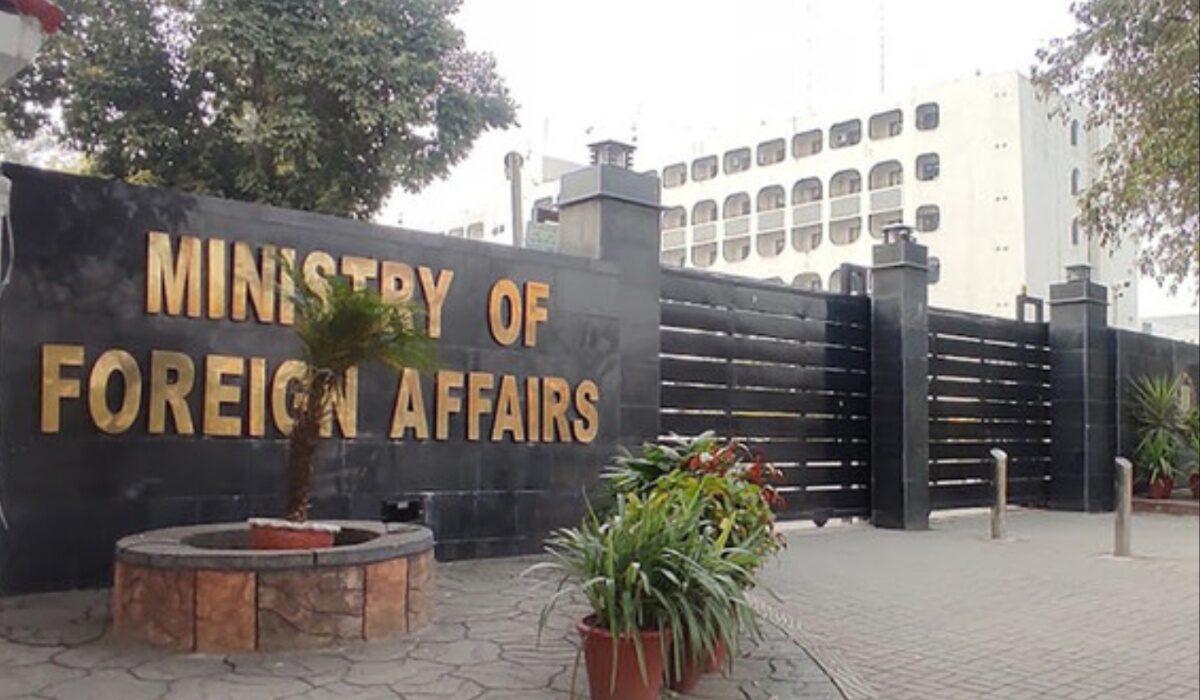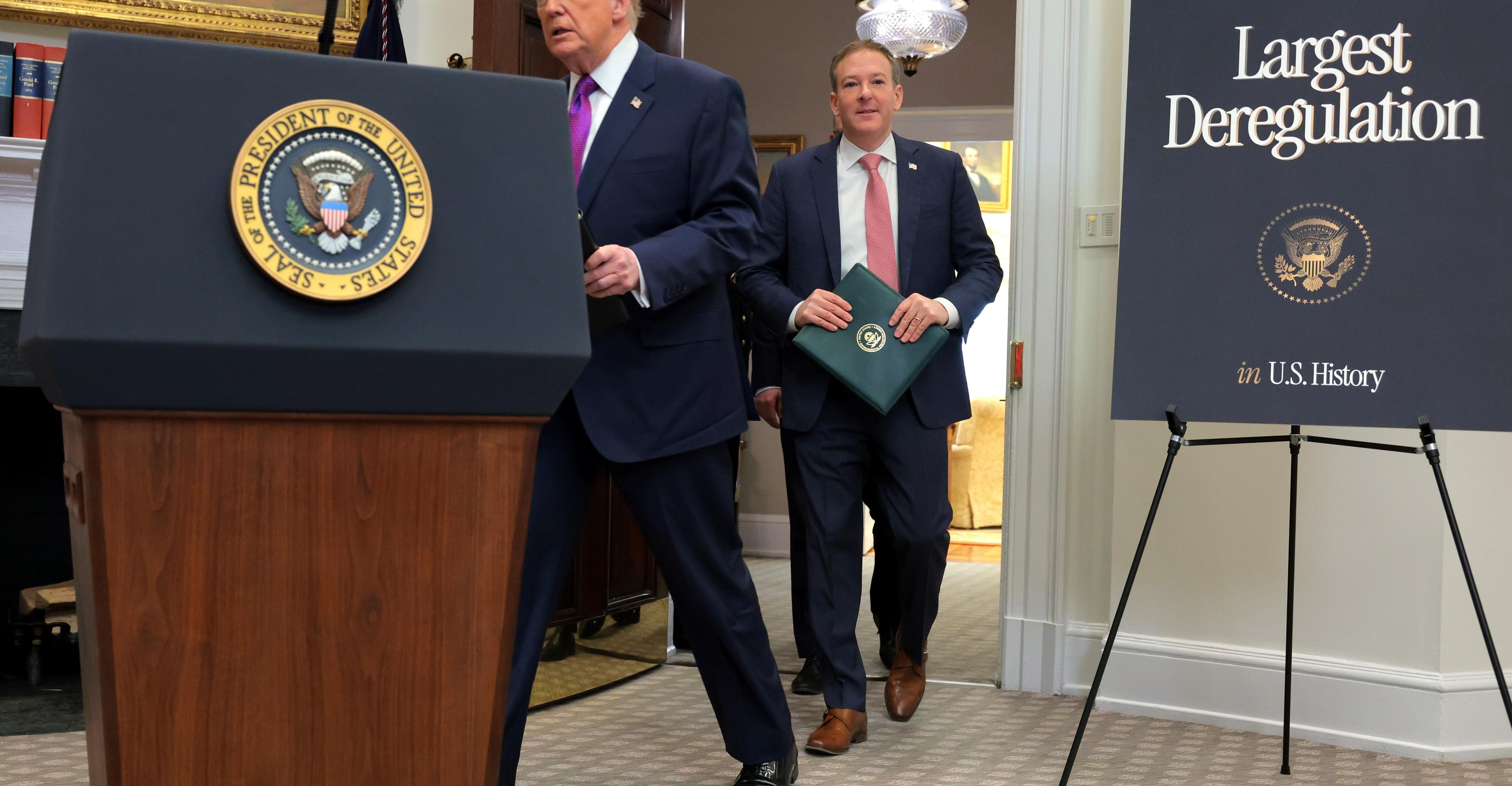Advocate Akmal Khan asks the Supreme Court to ensure transparent and on merit process and procedure for appointment of the judges in high courts as well as the apex court.


Islamabad: A constitutional writ petition has been moved to the Supreme Court of Pakistan seeking transparency and proper mechanism for appointment of judges in the superior judiciary.
Akmal Khan, a lawyer who has mentioned himself as a whistle blower in the plea, has challenged the existing ways of appointments of judges in the high courts as well as the Supreme Court of Pakistan.
The plea comes to the apex court at such a moment when the issue of the security, privacy of the judges of the superior judiciary has come to the limelight, and many voices have emerged on the conventional and the social media about iappointment process of the judges.
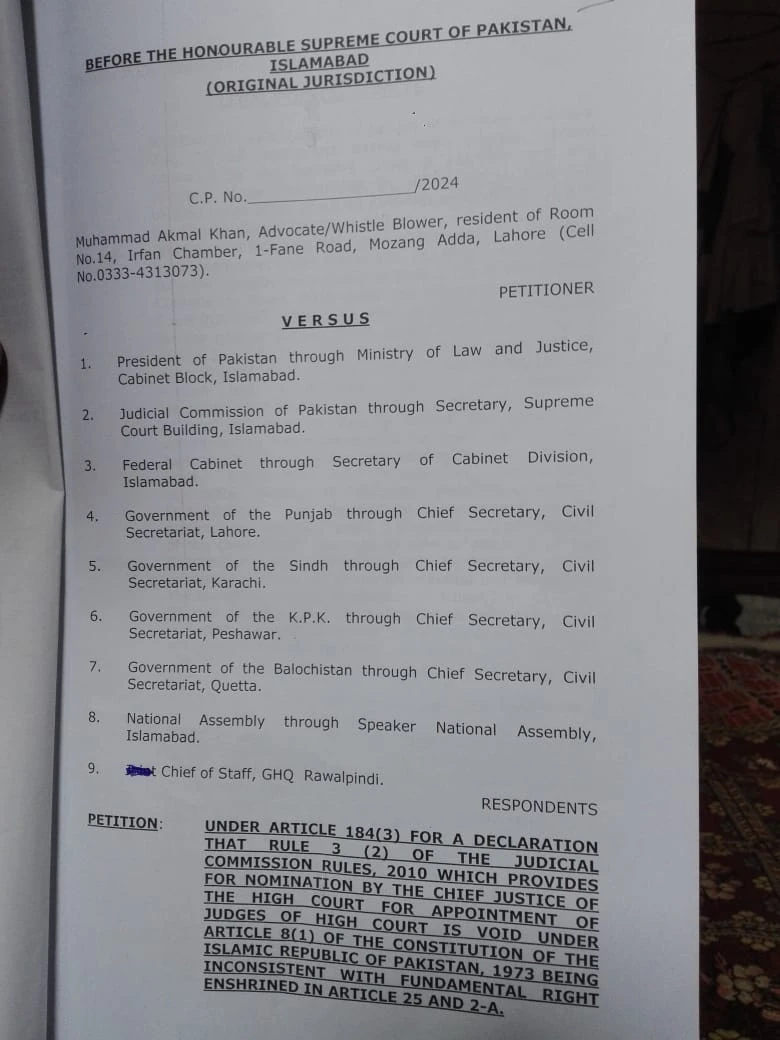
The lawyer has informed the top court that hundreds of eligible advocates are being ignored for appointment as judges in the top judiciary and nor they are being considered in this regard.
Akmal Khan also submitted that former Chief Justice of Pakistan Iftikhar Muhammad Chaudhary made Parliamentary Commission inept by virtue of rendition of judges regarding appointment of the judges including Justice Yawar Ali Khan, Justice Mamoon Rasheed Sheikh, Mazahar Ali Akbar Naqvi and Justice Farrukh Irfan Khan and etc.
Khan argued that Article 175-A of the Constitution was introduced through 18th Amendment enacting that in future the appointments would be made through an independent Commission overseen by a Committee of the parliamentarians.
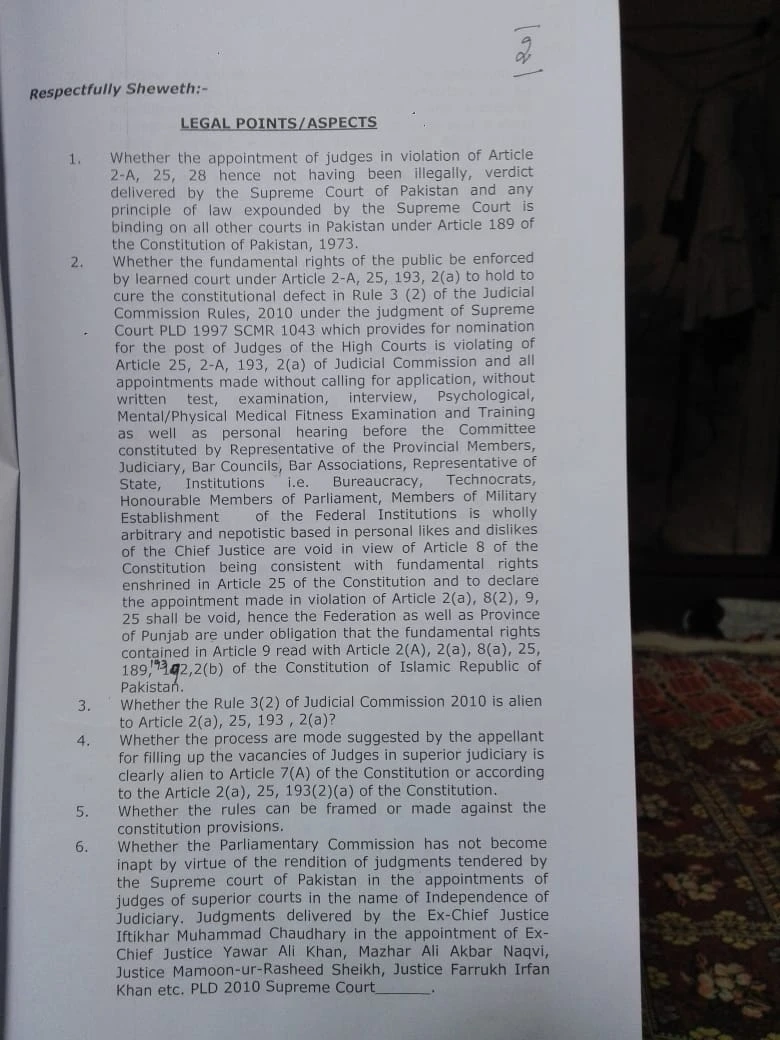
He argued that the Judicial Commission was empowered to make rules regulating the procedure. Nevertheless, Akmal Khan contended, the Rule 3(2) of the said Rules is ultra vires of Article 25. The future of thousands of advocates has turned dark due to the existing procedure of the appointment of the judges.
The petitioner submitted that nominations are always and never on merits unless the persons nominated are selected from amongst a large number of candidates invited through advertisement in the newspapers and are subjected to written examination and Interviews.
“There can be no merit if all eligible persons are not invited to compete. Merit arises out of competition,” said Advocate Khan.
He pointed out that nomination is personal as the chief justices nominate people according to their personal likes and dislikes.
He questioned that “rough and ready choice without any system of selection is not only unethical but also illegal,”.
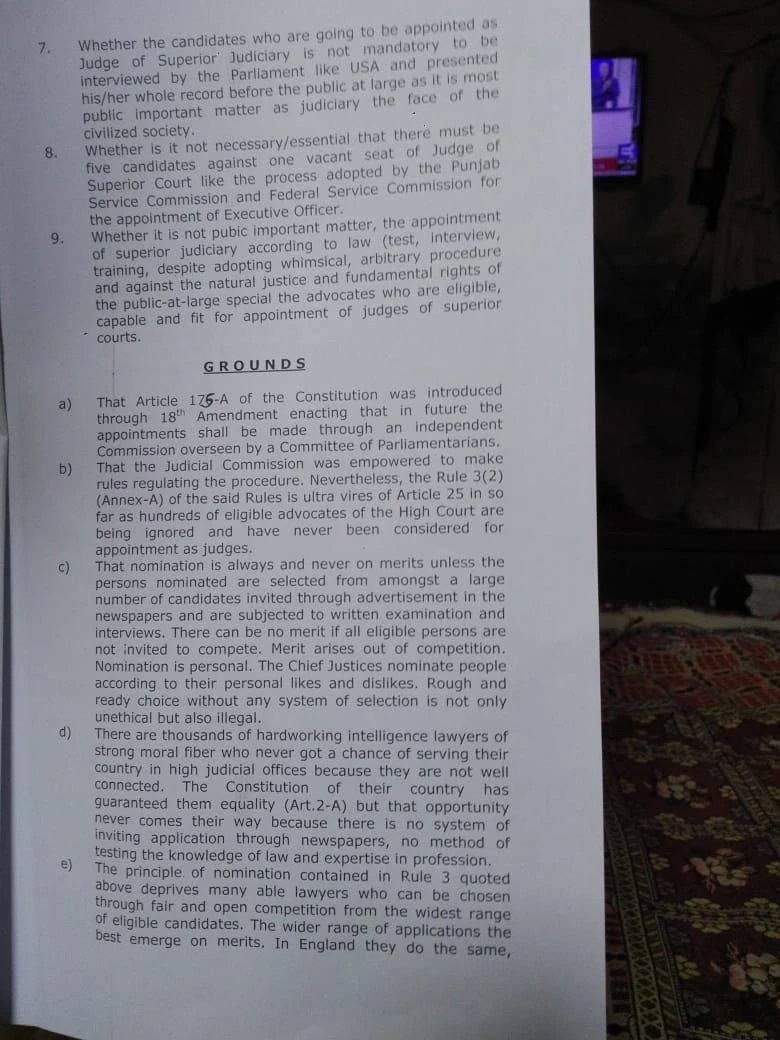
The petitioner also brought it to the light that there are thousands of hardworking intelligence lawyers of strong moral fiber who never got a chance of serving their country in high judicial offices because they are not well connected. The Constitution of their country has guaranteed them equality (Art.2-A) but that opportunity never comes their way because there is no system of inviting application through newspapers, no method of testing the knowledge of law and expertise in profession.
The lawyer submitted that the principle of nomination contained in Rule 3 quoted above deprives many able lawyers who can be chosen through fair and open competition from the widest range of eligible candidates. The wider range of applications the best emerge on merits. In England, Advocate Khan contended that they have set up Judicial Commission which is a Non Department Public Body (NDPB), by Act of 2005.
“The positions In the High Court of England and Wales "are advertised widely in the national press, legal publications, the professional and online,” he said.
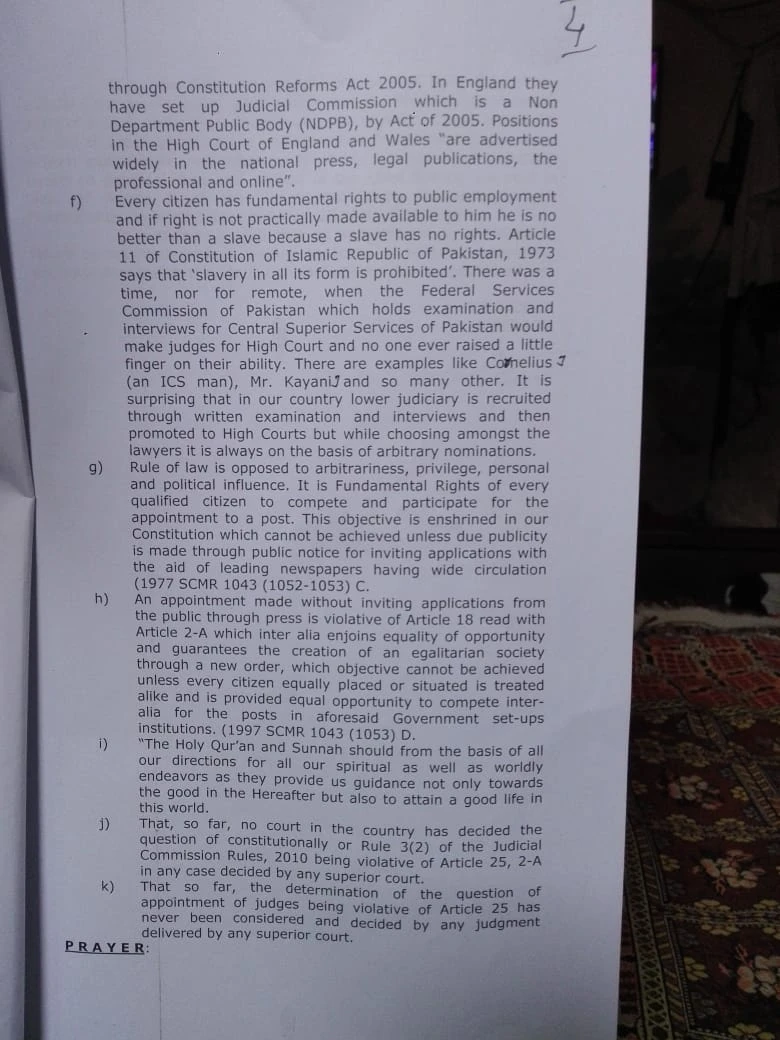
Advocate Akmal Khan also submitted that every citizen has fundamental rights to public employment and if right is not practically made available to him he is no better than a slave because a slave has no rights.
The lawyer contended that Holy Qur'an and Sunnah are main sources of directions for all the spiritual as well as worldly endeavors as they provide complete guidance not only towards the good in the Hereafter but also to attain a good life in this world.
He prayed to the Supreme Court that Rule 3(2) of the Judicial Commission Rules, 2010 which provides for nomination to the posts of Judges of the High Court is violative of Article 25, 2-A. 193 (2) (a) and all appointments made without calling for applications, without written examination and interview is wholly arbitrary and nepotistic based on personal likes and dislikes of the Chief Justices are void in view of Article 8 of the Constitution being inconsistent with Fundamental Right enshrined in Article 25 of the Constitution.
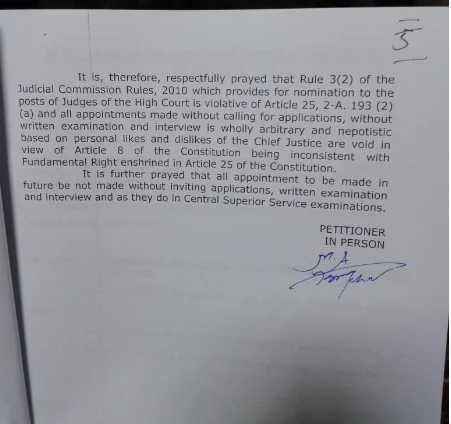
He also prayed the Supreme Court that all the appointments to be made in future be not made without inviting applications, written examination and interview and as they do in Central Superior Service examinations. The lawyer further prayed that the appointments of the judges should be stayed at this time till the disposal of this constitutional petition.

What the arrest of former Prince Andrew can teach us about power and abuse
- 7 hours ago
PM Shehbaz calls for independent, sovereign state of Palestine
- a day ago

The party-fication of productivity
- 7 hours ago
Pakistan, US agree to enhance bilateral trade, economic ties, counterterrorism cooperation
- a day ago

Gold prices continue to surge in Pakistan, global markets
- a day ago

The hottest new winter sport is about to get even hotter
- 7 hours ago
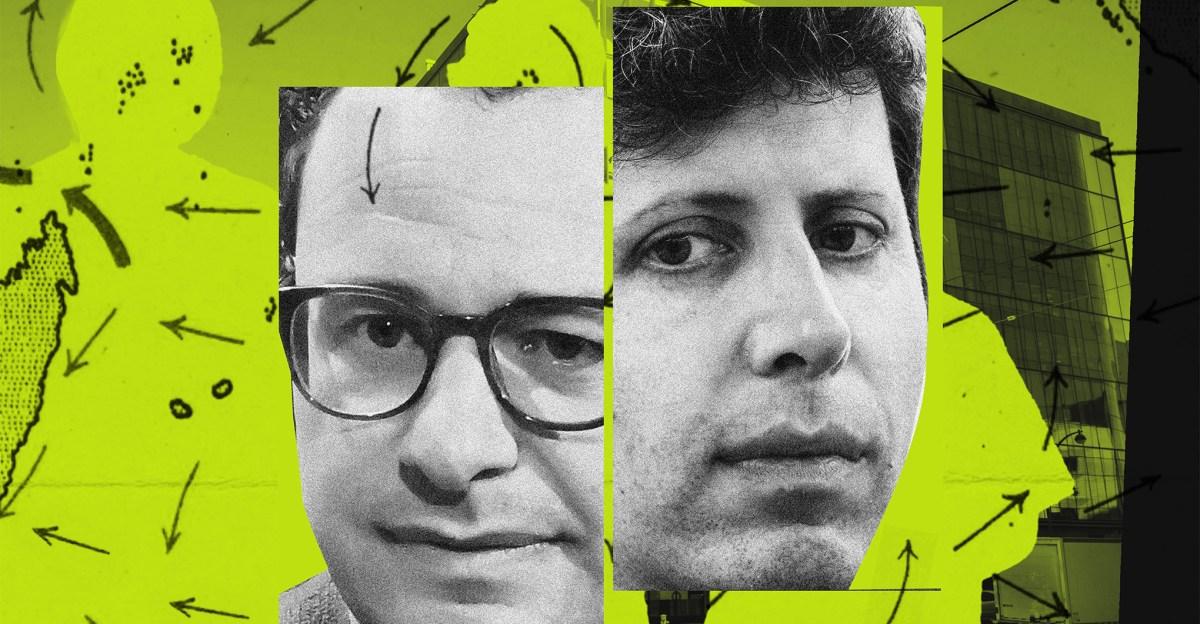
Money no longer matters to AI’s top talent
- 9 hours ago

Strong earthquake rattles eastern Afghanistan
- 17 hours ago
Why it's so difficult to break into the Premier League's top six
- 8 hours ago

It’s MAGA v Broligarch in the battle over prediction markets
- 9 hours ago

Magnitude 5.6 quake jolts parts of KP
- 19 hours ago
PMD predicts dry weather in most parts of country
- 19 hours ago


